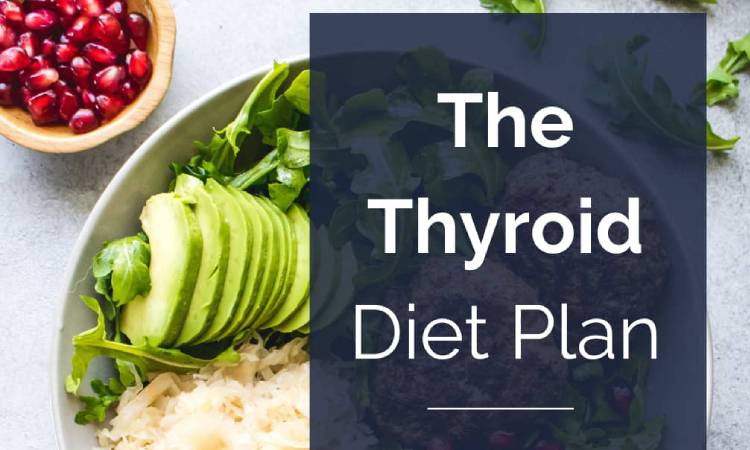Thyroid Diet Chart for Weight Loss
Thyroid Diet Chart for Weight Loss – Thyroid hormones execute many functions in your body, but maybe the one you are most known with is the role in controlling your metabolism. The thyroid supports maintaining energy levels and restorative calorie burning (thermogenesis). When it is active properly, this organ can improve or reduce the rate at which you burn calories, depending on what your body requires. If your thyroid function is low or uneasy, it is not able to do its job as efficiently, which can throw your metabolism out of whack.

There are a variety of factors why your thyroid might not be working at its peak level and we will discover those in this blog. We will also look at the genuine diet for thyroid function and end with an example menu of foods to eat and foods to avoid. Read about the Thyroid Diet Chart for Weight Loss below.
Thyroid | A Full Explanation
The thyroid gland is settled in the neck, right under your Adam’s apple. It is made up of two lobes that are joined by a band of tissue that is called the isthmus. The thyroid needs iodine – which you can get from seafood, seaweed, and iodized salt – to make thyroid hormones. These hormones affect the rate at which your body uses oxygen and makes energy. They also affect your blood pressure, heart rate, body temperature, weight, muscle strength, mood, fertility in men and women, skin health, digestion, menstrual cycles in women, memory function, concentration capabilities, and more.
Thyroid hormones are view “catabolic,” meaning they break down molecules to set free energy. More circulating active thyroid hormone enhances the number of calories you burn and enhances the basal metabolic rate. If your thyroid is not active properly and is not making or operating sufficient of these hormones, you might have a harder time losing weight because your basal metabolic rate is lower than it should be.
What is Hypothyroidism?
The inactivity of the thyroid gland is known as hypothyroidism. It is studied that 4% of people in the United States have this problem, but most go undiagnosed because it basically comes with few or no symptoms. The thyroid gland’s inactivity to make sufficient thyroid hormone can be caused by many reasons including:
- Hashimoto’s disease – An autoimmune health issue in which your immune system attacks your thyroid gland
- Thyroidectomy – The precise removal of all or part of the gland
- Radiation treatment for hyperthyroidism – Therapy for an overactive thyroid gland
- Congenital hypothyroidism – Congenital means that you come into the world with it.
Many health situations are sometimes connected with thyroid disease. These include:
- Type 1 diabetes – An autoimmune issue where the immune system attacks the insulin-making cells of the pancreas and outcomes in high blood sugar levels
- Celiac disease – An autoimmune issue activated by eating gluten, which causes malabsorption of nutrients and other health situations
- Fibromyalgia – A situation that causes extensive pain and tenderness all across the body
- Lupus – A chronic autoimmune connective tissue issue that can harm any part of your body. Various people with hypothyroidism do not have any symptoms.
As a result, you can see a doctor about some other situation and never realize that your thyroid gland has failed. If you have been diagnosed with hypothyroidism, you must understand that this situation can be managed. In some conditions, your thyroid medicine may require to be regulated from time to time, but most people can successfully maintain their disease and enjoy a normal life.
Which Nutritive Are Necessary For Thyroid Health?
While not a replacement for medicine suggested by your doctor, diet is one of the ways to help maintain hypothyroidism and support your thyroid gland. In terms of minerals and vitamins, the nutritive that have the largest effect on thyroid health include:
- Zinc – Zinc is an essential mineral for thyroid health because it supports your body’s converting T4 to T3. These are the two major forms of thyroid hormone, so if you are having a problem with converting T4 to T3, then zinc may be helpful for you. You can get your suggested daily allotment (%RDA) for zinc from chicken, oysters, beef, and lamb. But if you are taking medicine for your thyroid gland, it is necessary to make sure you also get sufficient zinc every day.
- Iodine – Iodine is an element of the thyroid hormones. The lack of iodine is the most normal cause of hypothyroidism in the world. Luckily, this issue can be effortlessly corrected. You can get your RDA for iodine from seafood or seaweed or from iodized salt. If you have been suffering from hypothyroidism, do not cut back on your consumption of iodine. As an alternative, consult with your doctor about whether supplementation may be perfect for you. You can also check the brand of salt you use to make sure it is iodized and make a change if suitable.
- Selenium – Selenium is another nutritive that is necessary for thyroid health. This mineral works with vitamin E to help save the thyroid gland from free-radical harm, which often appears due to autoimmune problems like Hashimoto’s disease. Brazil and grains nuts are rich in selenium. Other good origins of this nutrient include chicken, oysters, beef, and lamb. While putting selenium-rich foods is a good way to make sure you are getting enough of this mineral, supplements are not always suggested. This is because supplementations often offer bigger doses of nutrients and selenium can be toxic in bigger amounts.
Which Nutritives are Dangerous for Thyroid Health?
Goitrogens are materials that can barge into iodine digestion and cause a goiter. Goiter is a condition that appears when the thyroid gland gets bigger due to a lack of iodine. Various foods have goitrogens. These include:
- Cruciferous vegetables – These vegetables may be healthy, but they also have components that interfere with iodine uptake
- Cocoa and soy – These foods have toxins that can interfere with the thyroid gland
- Soy products such as miso, tofu, and tempeh – Some of these products are healthy for everyone on a low-carb diet while others may not be.
- Seeds such as flaxseed and sesame – These seeds may be healthy for everyone on a low-carb diet, but only if they are rinsed to remove the antinutrients
- Canola oil, cottonseed oil, and rapeseed oil – These oils can all cause issues when taken in extra quantity. If you have hypothyroidism, it is best to reduce your consumption of these oils.
Some cooking or preparation techniques may help decrease or slow the goitrogens in some of these foods.
Some foods that are great in Thyroid Diet Chart for Weight Loss
While backing a blend of low-carb and autoimmune diet rules, here are some foods that people with hypothyroidism can eat:
- Dressings And Condiments – While you want to regulate highly prepared foods, certain condiments and dressings offer a lot of flavor without many negative ingredients. For example, olive oil is rich in vitamins E and K so it can enhance thyroid function. Moreover, apple cider vinegar has acetic acid which may have antiviral properties. However, it is perfectly alright to eat dressings and seasonings made with these ingredients, specifically if you make them yourself.
- Gluten-Free Grains And Seeds – Adding gluten-free grains and seeds to your diet can help offer a great source of minerals, fiber, vitamins, and antioxidants. It can also decrease inflammation in the body. For these reasons, it is great to include whole grains in your diet if you can bear them. Some of the amazing gluten-free grains for a thyroid diet plan include: Rice, Buckwheat, Quinoa
- Eggs – Egg whites are rich in protein and yolks are rich in iodine and selenium. For these reasons, eggs can help enhance thyroid function and improve metabolism.
- Nuts and seeds – Nuts and seeds are good origins of healthy fiber, vitamins, fats, minerals, and antioxidants. They can also decrease inflammation in the body so they are good for those with Hashimoto’s thyroiditis. For these reasons, it is great to take nuts and seeds in your diet.
- Meat And Fish – All meats, including beef, lamb, and chicken, are good sources of the highest quality protein. Moreover, organ meats such as liver and kidneys are excellent sources of nutrition including vitamin A and iron. Fish and other seafood are great sources of iodine, protein, and anti-inflammatory omega-3 fatty acids.
- Fruits, especially berries – People with hypothyroidism are also low in vitamin C. This can lead to thyroid function problems. Berries are great in the immune-boosting nutrient so they can enhance thyroid health by controlling a healthy immune system. While fruit is high in organic sugar, it also has many nutrients such as antioxidants and vitamins that support thyroid function and a healthy immune system. Moreover, fiber slows down the absorption of that sugar. However, some of the fruits are higher in sugar than others so it may be good to limit your consumption of dates and other dried fruits.
- Vegetables – Many vegetables have antioxidants that help in a healthy immune system and save against inflammation. These involve butternut squash, carrots, artichokes, spinach, garlic, onions, sweet potatoes, asparagus, and cucumbers.
Conclusion
A hypothyroidism diet plan does not have to be confusing and hard to maintain for life. Rather, a thyroid diet plan can be simply simple to follow and manage if you know what foods to eat, and avoid, and which recipes you should make. To lose weight on this diet, the Thyroid Diet Chart for Weight Loss goes for full foods that are high in nutrition and limit highly prepared foods while removing gluten-containing grains, soy, caffeinated drinks, and alcohol.
Some Frequently Asked Questions(FAQs)
Question 1 – What is Thyroid?
Answer – The thyroid gland is a little, butterfly-shaped gland situated in the neck that makes hormones responsible for adjusting many bodily functions, including energy production, metabolism, and hormone balance. The ineffectiveness of the thyroid gland can lead to a range of health problems, involving fatigue, weight gain or loss, and mood swings.
Question 2 – What elements affect thyroid health?
Answer – Various reasons can affect your thyroid, including dietary habits, stress, genetics, and environmental pollutants. According to research, thyroid issues can result from diets low in zinc, selenium, and especially iodine. Moreover, imbalances can also be an outcome of worse gut health.
Question 3 – What can thyroid patients eat to lose weight?
Answer – Eating a diet that is filled with fruits and vegetables.
Question 4 – Which food items are good for thyroid patients?
Answer – Macadamia nuts, brazil nuts, and hazelnuts are good for thyroid patients.




